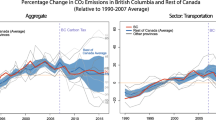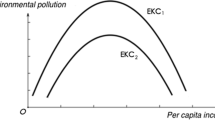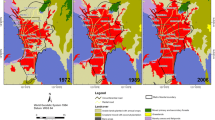Abstract
The enactment of the Environmental Protection Tax Law has conferred upon Chinese local governments, the discretionary authority to devise local rates for the environmental protection tax (EPT). The EPT difference among provinces may cause strategic migration of enterprises. We investigate the impact of the EPT on the migration of heavily polluting enterprises and assess its economic ramifications through the application of the difference-in-differences-in-differences (DDD) methodology, utilizing data derived from publicly traded Chinese heavily polluting enterprises spanning the period from 2016 to 2020. We find that heavily polluting enterprises with high EPT will set up non-local subsidiaries in areas with low EPT. The influence is more pronounced in the eastern region, with high labor power costs, and for enterprises in highly competitive and large-scale industries. The parent enterprise's output, profit, and strategic innovation activities increase after enterprise migration. This research deepens our understanding of the impact of EPT differences on the relocation of heavily polluting enterprises. Our research provides important policy implications to facilitate legislation and implementation related to environmental taxes.
Graphical abstract






Similar content being viewed by others
Notes
Collated raw data and running code will be made available upon reasonable request.
Including: Class B (Mining), C14 (Food), C15 (Alcoholic Beverages), C17 (Textiles), C18 (Clothing), C19 (Furs), C22 (Paper), C23 (Printing), C25 (Petroleum), C26 (Chemical Materials), C27 (Pharmaceuticals), C28 (Chemical Manufacturing), C29 (Plastics), C30 (Plastics), C31 (Non-metallic), C32 (Metals), and D (Production and Supply of Electricity, Gas, and Water).
Including: C13 (Agricultural By-Products), C16 (Tobacco), C20 (Timber Processing), C21 (Furniture Manufacturing), C24 (Stationery), C35 (General Equipment), C36 (Special Equipment), C37 (Transportation), C39 (Electrical Machinery), C40 (Electronics Manufacturing), C41 (Instruments), C42 (Arts and Crafts Manufacturing), and C43 (Waste Resource Recycling).
References
Ben Kheder, S., & Zugravu, N. (2012). Environmental regulation and French firms location abroad: An economic geography model in an international comparative study. Ecological Economics, 77, 48–61. https://doi.org/10.1016/j.ecolecon.2011.10.005
Bena, J., Ortiz-Molina, H., & Simintzi, E. (2022). Shielding firm value: Employment protection and process innovation. Journal of Financial Economics, 146(2), 637–664. https://doi.org/10.1016/j.jfineco.2021.10.005
Böhringer, C., Balistreri, E. J., & Rutherford, T. F. (2012). The role of border carbon adjustment in unilateral climate policy: Overview of an Energy Modeling Forum study (EMF 29). Energy Economics, 34, S97–S110. https://doi.org/10.1016/j.eneco.2012.10.003
Bu, M., Liu, Z., Wagner, M., & Yu, X. (2013). Corporate social responsibility and the pollution haven hypothesis: Evidence from multinationals’ investment decision in China. Asia-Pacific Journal of Accounting & Economics, 20(1), 85–99. https://doi.org/10.1080/16081625.2013.759175
Cai, H., Chen, Y., & Gong, Q. (2016). Polluting thy neighbor: Unintended consequences of China׳s pollution reduction mandates. Journal of Environmental Economics and Management, 76, 86–104. https://doi.org/10.1016/j.jeem.2015.01.002
Cai, X., Che, X., Zhu, B., Zhao, J., & Xie, R. (2018). Will developing countries become pollution havens for developed countries? An empirical investigation in the Belt and Road. Journal of Cleaner Production, 198, 624–632. https://doi.org/10.1016/j.jclepro.2018.06.291
Chan, Y. T. (2019). Optimal Environmental Tax Rate in an Open Economy with Labor Migration—An E-DSGE Model Approach. Sustainability, 11(19), 5147. https://doi.org/10.3390/su11195147
Chao, C.-C., Ee, M. S., Laffargue, J.-P., & Yu, E. S. H. (2016). Environmental migration and capital mobility. International Review of Economics & Finance, 42, 430–441. https://doi.org/10.1016/j.iref.2015.10.014
Chen, B. (2021). Industrial agglomeration and the pollution haven hypothesis: Evidence from Chinese prefectures. Journal of the Asia Pacific Economy, pp. 1–28. https://doi.org/10.1080/13547860.2021.1892567
Cheng, Z., Chen, X., & Wen, H. (2022). How does environmental protection tax affect corporate environmental investment? Evidence from Chinese Listed Enterprises. Sustainability, 14(5), 2932. https://doi.org/10.3390/su14052932
Cole, M. A. (2004). Trade, the pollution haven hypothesis and the environmental Kuznets curve: Examining the linkages. Ecological Economics, 48(1), 71–81. https://doi.org/10.1016/j.ecolecon.2003.09.007
Copeland, B. R., & Taylor, M. S. (1994). North-south trade and the environment. The Quarterly Journal of Economics, 109(3), 755–787. https://doi.org/10.2307/2118421
Deng, Y., Wu, Y., & Xu, H. (2019). Political turnover and firm pollution discharges: An empirical study. China Economic Review, 58, 101363. https://doi.org/10.1016/j.chieco.2019.101363
Deschênes, O., Greenstone, M., & Shapiro, J. S. (2017). Defensive investments and the demand for air quality: Evidence from the NOx budget program. American Economic Review, 107(10), 2958–2989. https://doi.org/10.1257/aer.20131002
Dou, G., Guo, H., Zhang, Q., & Li, X. (2019). A two-period carbon tax regulation for manufacturing and remanufacturing production planning. Computers and Industrial Engineering, 128, 502–513. https://doi.org/10.1016/j.cie.2018.12.064
Dou, J., & Han, X. (2019). How does the industry mobility affect pollution industry transfer in China: Empirical test on Pollution Haven Hypothesis and Porter Hypothesis. Journal of Cleaner Production, 217, 105–115. https://doi.org/10.1016/j.jclepro.2019.01.147
Driver, C., & Muñoz-Bugarin, J. (2019). Financial constraints on investment: Effects of firm size and the financial crisis. Research in International Business and Finance, 47, 441–457. https://doi.org/10.1016/j.ribaf.2018.09.006
Duvivier, C., & Xiong, H. (2013). Transboundary pollution in China: A study of polluting firms’ location choices in Hebei province. Environment and Development Economics, 18(4), 459–483. https://doi.org/10.1017/S1355770X13000168
Eichner, T., & Pethig, R. (2018). Competition in emissions standards and capital taxes with local pollution. Regional Science and Urban Economics, 68, 191–203. https://doi.org/10.1016/j.regsciurbeco.2017.11.004
Eskeland, G. S., & Harrison, A. E. (2003). Moving to greener pastures? Multinationals and the pollution haven hypothesis. Journal of Development Economics, 70(1), 1–23. https://doi.org/10.1016/S0304-3878(02)00084-6
Feng, P., Lu, H., Li, W., & Wang, X. (2022). Tax policies of low carbon in China: Effectiveness evaluation, system design and prospects. Frontiers in Environmental Science, 10, 953512. https://doi.org/10.3389/fenvs.2022.953512
Fu, S., Ma, Z., Ni, B., Peng, J., Zhang, L., & Fu, Q. (2021). Research on the spatial differences of pollution-intensive industry transfer under the environmental regulation in China. Ecological Indicators, 129, 107921. https://doi.org/10.1016/j.ecolind.2021.107921
Gong, R., Wu, Y.-Q., Chen, F.-W., & Yan, T.-H. (2020). Labor Costs, market environment and green technological innovation: Evidence from high-pollution firms. International Journal of Environmental Research and Public Health, 17(2), 522. https://doi.org/10.3390/ijerph17020522
Hanson, G. H. (2005). Market potential, increasing returns and geographic concentration. Journal of International Economics, 67(1), 1–24. https://doi.org/10.1016/j.jinteco.2004.09.008
Hao, L.-N., Umar, M., Khan, Z., & Ali, W. (2021). Green growth and low carbon emission in G7 countries: How critical the network of environmental taxes, renewable energy and human capital is? Science of the Total Environment, 752, 141853. https://doi.org/10.1016/j.scitotenv.2020.141853
Hao, Y., Deng, Y., Lu, Z.-N., & Chen, H. (2018). Is environmental regulation effective in China? Evidence from city-level panel data. Journal of Cleaner Production, 188, 966–976. https://doi.org/10.1016/j.jclepro.2018.04.003
He, Y., Song, W., & Yang, F. (2021a). Research on the supply efficiency of marine ecological products in the yangtze river delta costal urban agglomerations based on DEA-tobit model. Sustainability, 13(12), 6840. https://doi.org/10.3390/su13126840
He, Y., Wen, C., & He, J. (2020). The influence of China environmental protection tax law on firm performance—evidence from stock markets. Applied Economics Letters, 27(13), 1044–1047. https://doi.org/10.1080/13504851.2019.1659488
He, Y., Wen, C., & Zheng, H. (2021b). Does China’s environmental protection tax law effectively influence firms? Evidence from stock markets. Emerging Markets Finance and Trade, 57(15), 4436–4447. https://doi.org/10.1080/1540496X.2020.1822810
Heckman, J. J., Ichimura, H., & Todd, P. (1998). Matching as an econometric evaluation estimator. Review of Economic Studies, 65(2), 261–294. https://doi.org/10.1111/1467-937X.00044
Heckman, J. J., Ichimura, H., & Todd, P. E. (1997). Matching as an econometric evaluation estimator: Evidence from evaluating a job training programme. The Review of Economic Studies, 64(4), 605–654. https://doi.org/10.2307/2971733
Imbert, C., Seror, M., Zhang, Y., & Zylberberg, Y. (2022). Migrants and firms: Evidence from China. American Economic Review, 112(6), 1885–1914. https://doi.org/10.1257/aer.20191234
Jacobson, L. S., LaLonde, R. J., & Sullivan, D. G. (1992). Earnings Losses of Displaced Workers. W.E. Upjohn Institute. https://doi.org/10.17848/wp92-11
Javorcik, B. S., & Wei, S.-J. (2003). Pollution Havens and Foreign Direct Investment: Dirty Secret or Popular Myth? Contributions in Economic Analysis & Policy, 3(2). https://doi.org/10.2202/1538-0645.1244
Karp, L. (2005). Nonpoint source pollution taxes and excessive tax burden. Environmental and Resource Economics, 31(2), 229–251. https://doi.org/10.1007/s10640-005-1772-8
Krass, D., Nedorezov, T., & Ovchinnikov, A. (2013). Environmental taxes and the choice of green technology. Production and Operations Management. https://doi.org/10.1111/poms.12023
Kronenberg, K. (2013). Firm relocations in the Netherlands: Why do firms move, and where do they go?*. Papers in Regional Science, 92(4), 691–713. https://doi.org/10.1111/j.1435-5957.2012.00443.x
Kumbhakar, S. C., Badunenko, O., & Willox, M. (2022). Do carbon taxes affect economic and environmental efficiency? The case of British Columbia’s manufacturing plants. Energy Economics, 115, 106359. https://doi.org/10.1016/j.eneco.2022.106359
Li, M., Du, W., & Tang, S. (2021). Assessing the impact of environmental regulation and environmental co-governance on pollution transfer: Micro-evidence from China. Environmental Impact Assessment Review, 86, 106467. https://doi.org/10.1016/j.eiar.2020.106467
Li, X., Guo, D., & Feng, C. (2022). The Carbon Emissions trading policy of China: Does it really promote the enterprises’ green technology innovations? International Journal of Environmental Research and Public Health, 19(21), 14325. https://doi.org/10.3390/ijerph192114325
Lin, B. (2023). Spatio-temporal process and influencing factors of polluting enterprises’ migration: An empirical study based on the Yangtze River Delta. Scientific Reports, 13(1), 13360. https://doi.org/10.1038/s41598-023-40621-8
Lin, B., & Wang, J. (2023). Will the “Pairing Assistance” policy trigger the migration of polluting enterprises? An empirical study based on the Yangtze River Delta Region. Sustainability, 15(3), 1942. https://doi.org/10.3390/su15031942
Lin, B., & Xu, M. (2019). Exploring the green total factor productivity of China’s metallurgical industry under carbon tax: A perspective on factor substitution. Journal of Cleaner Production, 233, 1322–1333. https://doi.org/10.1016/j.jclepro.2019.06.137
Liu, H., Zafar, M. W., Sinha, A., & Khan, I. (2023). The path to sustainable environment: Do environmental taxes and governance matter? Sustainable Development, 31(4), 2278–2290. https://doi.org/10.1002/sd.2505
Long, F., Lin, F., & Ge, C. (2022). Impact of China’s environmental protection tax on corporate performance: Empirical data from heavily polluting industries. Environmental Impact Assessment Review, 97, 106892. https://doi.org/10.1016/j.eiar.2022.106892
Long, H., Feng, G., Gong, Q., & Chang, C. (2023). ESG performance and green innovation: An investigation based on quantile regression. Business Strategy and the Environment, bse.3410. https://doi.org/10.1002/bse.3410
López-González, E., Martínez-Ferrero, J., & García-Meca, E. (2019). Does corporate social responsibility affect tax avoidance: Evidence from family firms. Corporate Social Responsibility and Environmental Management, 26(4), 819–831. https://doi.org/10.1002/csr.1723
Ma, Z., Zhao, J., & Ni, J. (2018). Green tax legislation for sustainable development in China. The Singapore Economic Review, 63(04), 1059–1083. https://doi.org/10.1142/S0217590817420103
Matsumoto, A., Merlone, U., & Szidarovszky, F. (2012). Some notes on applying the Herfindahl-Hirschman Index. Applied Economics Letters, 19(2), 181–184. https://doi.org/10.1080/13504851.2011.570705
Mitze, T., & Kreutzer, F. (2023). Relocation, innovation, and the difference that firm size makes: Insights for global sourcing strategies of SMEs. Journal of International Entrepreneurship. https://doi.org/10.1007/s10843-023-00326-5
Mukhopadhyay, A., & Pandit, V. (2014). Control of industrial air pollution through sustainable development. Environment, Development and Sustainability, 16(1), 35–48. https://doi.org/10.1007/s10668-013-9473-x
Pan, W., Cao, H., & Liu, Y. (2023). “Green” innovation, privacy regulation and environmental policy. Renewable Energy, 203, 245–254. https://doi.org/10.1016/j.renene.2022.12.025
Peng, N., & Zhang, X. (2022). The impact of environmental regulations on the location choice of newly built polluting firms: Based on the perspective of new economic geography. Environmental Science and Pollution Research, 29(39), 59802–59815. https://doi.org/10.1007/s11356-022-19956-8
Peng, X. (2020). Strategic interaction of environmental regulation and green productivity growth in China: Green innovation or pollution refuge? Science of the Total Environment, 732, 139200. https://doi.org/10.1016/j.scitotenv.2020.139200
Porter, M. E., & van der Linde, C. (1995). Toward a new conception of the environment-competitiveness relationship. Journal of Economic Perspectives, 9(4), 97–118. https://doi.org/10.1257/jep.9.4.97
Qi, S., Zhou, C., Li, K., & Tang, S. (2021). The impact of a carbon trading pilot policy on the low-carbon international competitiveness of industry in China: An empirical analysis based on a DDD model. Journal of Cleaner Production, 281, 125361. https://doi.org/10.1016/j.jclepro.2020.125361
Ren, M., Huang, C., Wang, X., Hu, W., & Zhang, W. (2019). Research on the distribution of pollution-intensive industries and their spatial effects in China. Sustainability, 11(19), 5378. https://doi.org/10.3390/su11195378
Rennings, K., & Rammer, C. (2011). The impact of regulation-driven environmental innovation on innovation success and firm performance. Industry and Innovation, 18(3), 255–283. https://doi.org/10.1080/13662716.2011.561027
Sapkota, P., & Bastola, U. (2017). Foreign direct investment, income, and environmental pollution in developing countries: Panel data analysis of Latin America. Energy Economics, 64, 206–212. https://doi.org/10.1016/j.eneco.2017.04.001
Solarin, S. A., Al-Mulali, U., Musah, I., & Ozturk, I. (2017). Investigating the pollution haven hypothesis in Ghana: An empirical investigation. Energy, 124, 706–719. https://doi.org/10.1016/j.energy.2017.02.089
Sun, X., Zheng, Y., Zhang, C., Li, X., & Wang, B. (2022). The Effect of China’s pilot low-carbon city initiative on enterprise labor structure. Frontiers in Energy Research, 9, 821677. https://doi.org/10.3389/fenrg.2021.821677
Talpur, A. B. (2023). Market power and concentration-performance analysis of the banking sector: A comparative study of Singapore and Pakistan. Social Sciences and Humanities Open, 7(1), 100383. https://doi.org/10.1016/j.ssaho.2022.100383
Tingbani, I., Salia, S., Hussain, J. G., & Alhassan, Y. (2023). Environmental tax, SME financing constraint, and innovation: evidence from OECD countries. IEEE Transactions on Engineering Management, 70(3), 1006–1025. https://doi.org/10.1109/TEM.2021.3110812
Wang, C., & Lin, Y. (2022). Does bargaining power mitigate the relationship between environmental regulation and firm performance? Evidence from China. Journal of Cleaner Production, 331, 129859. https://doi.org/10.1016/j.jclepro.2021.129859
Wang, H., Li, T., Zhu, J., Jian, Y., Wang, Z., & Wang, Z. (2023). China’s new environmental protection law: Implications for mineral resource policy, environmental precaution and green finance. Resources Policy, 85, 104045. https://doi.org/10.1016/j.resourpol.2023.104045
Wang, Q., Xu, X., & Liang, K. (2021). The impact of environmental regulation on firm performance: Evidence from the Chinese cement industry. Journal of Environmental Management, 299, 113596. https://doi.org/10.1016/j.jenvman.2021.113596
Wang, Z., Yu, L., Zheng, M., Xing, Y., Liu, X., Wang, Y., & Xiao, Z. (2022). One fee, two reductions: The double abatement effect of pollutant discharge fees on industrial pollution and carbon emissions. Frontiers in Environmental Science, 10, 928434. https://doi.org/10.3389/fenvs.2022.928434
Wu, H., Guo, H., Zhang, B., & Bu, M. (2017). Westward movement of new polluting firms in China: Pollution reduction mandates and location choice. Journal of Comparative Economics, 45(1), 119–138. https://doi.org/10.1016/j.jce.2016.01.001
Wu, Y., Sheng, J., & Huang, F. (2015). China’s future investments in environmental protection and control of manufacturing industry: Lessons from developed countries. Natural Hazards, 77(3), 1889–1901. https://doi.org/10.1007/s11069-015-1681-2
Xia, J., Zhan, X., Li, R. Y. M., & Song, L. (2022). The relationship between fiscal decentralization and China’s low carbon environmental governance performance: The malmquist index, an SBM-DEA and systematic GMM approaches. Frontiers in Environmental Science, 10, 945922. https://doi.org/10.3389/fenvs.2022.945922
Xing, Y., & Kolstad, C. D. (2002). Do lax environmental regulations attract foreign investment? Environmental and Resource Economics, 21(1), 1–22. https://doi.org/10.1023/A:1014537013353
Yeo, B.-L., & Coleman, A. (2019). Taxes versus emissions trading system: Evaluating environmental policies that affect multiple types of pollution. Environmental Economics and Policy Studies, 21(1), 141–169. https://doi.org/10.1007/s10018-018-0225-x
Yi, C., Zhao, X., Huang, Y., Yu, J., & Zhang, J. (2022). Migration networks and subsidiary survival of EMNCs: The mediating effect of entry mode. Managerial and Decision Economics, 43(6), 2299–2310. https://doi.org/10.1002/mde.3526
Yu, H., Liao, L., Qu, S., Fang, D., Luo, L., & Xiong, G. (2021). Environmental regulation and corporate tax avoidance: A quasi-natural experiments study based on China’s new environmental protection law. Journal of Environmental Management, 296, 113160. https://doi.org/10.1016/j.jenvman.2021.113160
Zhang, B., Yu, L., & Sun, C. (2022a). How does urban environmental legislation guide the green transition of enterprises? Based on the perspective of enterprises’ green total factor productivity. Energy Economics, 110, 106032. https://doi.org/10.1016/j.eneco.2022.106032
Zhang, C., Zou, C. F., Luo, W., & Liao, L. (2022b). Effect of environmental tax reform on corporate green technology innovation. Frontiers in Environmental Science, 10, 1036810. https://doi.org/10.3389/fenvs.2022.1036810
Zhang, J. (2023). Optimization of the environmental protection tax system design based on artificial intelligence. Frontiers in Environmental Science, 10, 1076158. https://doi.org/10.3389/fenvs.2022.1076158
Zhao, A., Wang, J., Sun, Z., & Guan, H. (2022). Environmental taxes, technology innovation quality and firm performance in China—A test of effects based on the Porter hypothesis. Economic Analysis and Policy, 74, 309–325. https://doi.org/10.1016/j.eap.2022.02.009
Zhao, L., Yu, Z., & Onuma, Y. (2005). A theory of mutual migration of polluting firms. Canadian Journal of Economics/revue Canadienne D’économique, 38(3), 900–918. https://doi.org/10.1111/j.0008-4085.2005.00308.x
Zhao, X., & Sun, B. (2016). The influence of Chinese environmental regulation on corporation innovation and competitiveness. Journal of Cleaner Production, 112, 1528–1536. https://doi.org/10.1016/j.jclepro.2015.05.029
Zheng, D., & Shi, M. (2017). Multiple environmental policies and pollution haven hypothesis: Evidence from China’s polluting industries. Journal of Cleaner Production, 141, 295–304. https://doi.org/10.1016/j.jclepro.2016.09.091
Acknowledgements
We are grateful for the financial support from the General Project of Shaanxi Provincial Department of Soft Science Research (2023-CX-RKX-126) and Xi’an International Studies University (XISU) Research Fund (22XWB02).
Author information
Authors and Affiliations
Corresponding authors
Ethics declarations
Conflict of interest
The authors declare that they have no known competing financial interests or personal relationships that could have appeared to influence the work reported in this paper. The data for this research will be made available upon appropriate request.
Additional information
Publisher's Note
Springer Nature remains neutral with regard to jurisdictional claims in published maps and institutional affiliations.
Rights and permissions
Springer Nature or its licensor (e.g. a society or other partner) holds exclusive rights to this article under a publishing agreement with the author(s) or other rightsholder(s); author self-archiving of the accepted manuscript version of this article is solely governed by the terms of such publishing agreement and applicable law.
About this article
Cite this article
Zhao, N., Zhao, M., Long, H. et al. Facing or evading? The impact of environmental taxes on the migration of heavily polluting enterprises in China. Environ Dev Sustain (2024). https://doi.org/10.1007/s10668-023-04381-9
Received:
Accepted:
Published:
DOI: https://doi.org/10.1007/s10668-023-04381-9




